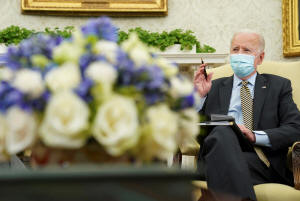Biden's budget meets criticism from right and left on Pentagon spending
 Send a link to a friend
Send a link to a friend
 [April 10, 2021]
By Trevor Hunnicutt [April 10, 2021]
By Trevor Hunnicutt
WASHINGTON (Reuters) - U.S. President Joe
Biden asked Congress to sharply hike spending on climate change, cancer
and underperforming schools, but his first budget wishlist on Friday
drew howls of bipartisan concern over military spending.
The $1.5 trillion budget, reflecting an 8% increase in base funding from
this year, marks a sharp contrast with the goals of Biden's predecessor,
Donald Trump.
It would spread billions of dollars more across areas ranging from
public transit, poor schools, toxic site clean-ups, foreign aid and
background checks on gun sales, but spend nothing on border walls.
The budget "makes things fairer," said Treasury Secretary Janet Yellen.
Yet the proposal was greeted by bipartisan scorn over its suggested
funding for the Department of Defense, roughly even on an
inflation-adjusted basis at $715 billion. The administration also cut an
"Overseas Contingency Operations" account that even government
bureaucrats said had come to serve as a slush fund for extra military
spending.

Biden's request displeased both liberals hoping to impose cuts and hawks
who want military spending to increase to deal with threats from China,
Russia, Iran and North Korea - a reminder of the uphill battle Biden
faces in delivering the policies he promised as a candidate beyond the
COVID-19 emergency.
Graphic: Education, health gain in Biden proposed budget https://graphics.reuters.com/USA-BIDEN/yzdvxbomqvx/chart.png
PENTAGON SPENDING
Five top Senate Republicans including Minority Leader Mitch McConnell
issued a joint statement warning that the Biden plan sent "a terrible
message" to U.S. allies and adversaries and called into question the
administration's willingness to confront China.
"We can't afford to fail in our constitutional responsibility to provide
for the common defense," wrote lawmakers including top Republicans on
critical Senate committees involved in the budget-making process.
The U.S. allocates nearly half its discretionary budget to military and
defense, and has long outspent any other country.
U.S. Representative Ro Khanna of California, a top liberal Democratic
voice on security matters, said the military spending request was
"disappointing" and left open the possibility of "wasteful spending" on
missiles.
Senator Bernie Sanders of Vermont, the chairman of the Budget Committee
and a top liberal who frequently collaborates with Biden, said he was
broadly supportive of the budget but said it was "time for us to take a
serious look" at the Pentagon's "waste and fraud."
The agency failed https://www.reuters.com/article/us-usa-pentagon-auditor/pentagon-fails-audit-yet-again-could-pass-around-2027-comptroller-says-idUSKBN27X03P
its comprehensive audit in fiscal 2020, the third year in a row,
reflecting broad system and accounting problems.

'MOMENT OF POSSIBILITY'
Nearly three months into a job consumed by the fight against the
COVID-19 pandemic, Biden's proposal document offered a long-awaited
glimpse into the new president's agenda.
Biden would increase spending by $14 billion across agencies to deal
with the effects of greenhouse gas emissions, a shift from the Trump
administration's dismissal of climate science.
[to top of second column]
|

President Joe Biden speaks during an economic briefing in the Oval
Office at the White House in Washington, U.S., April 9, 2021.
REUTERS/Kevin Lamarque

The president would spend millions on dealing with rising numbers of
unaccompanied children showing up at the country's southern border
from Central America, including $861 million to invest in that
region to stop asylum-seekers from coming to the United States.
But his budget would provide no funding for the construction of a
border wall, the administration said, a signature Trump priority,
and would increase funding for investigation of immigration agents
accused of "white supremacy."
Among the biggest proposed increases in funding is $36.5 billion for
a federal aid program for public schools in poorer neighborhoods,
more than double the 2021 level, and for researching deadly diseases
other than the COVID-19 pandemic that has dominated his term in
office so far.
"This moment of crisis is also a moment of possibility," Biden's
acting budget director, Shalanda Young, wrote in a letter to the
Senate.
Biden would spend $6.5 billion to launch a group leading targeted
research into diseases from cancer to diabetes and Alzheimer's, a
program that reflects Biden's long desire to use government spending
to create breakthroughs in medical research.
SKINNIER BUDGET
The historically short "skinny" budget was delayed, spanned just 41
pages and did not address how much the country's debt will increase
or what taxes will fund the spending.
By contrast, the first proposal budget issued by President Barack
Obama and then-Vice President Biden in 2009 was published in
February and stretched to 134 pages.
The document also provides only cursory spending figures on
"discretionary" programs and departments where Congress has
flexibility to decide what it wants to spend for the fiscal year
starting in October. That does not include areas deemed mandatory
including old-age, disability, unemployment and medical benefits,
which consume more than two-thirds of the overall budget.

The document also does not include Biden's $2 trillion
infrastructure proposal or another large spending bill expected in
the coming weeks. Those changes would be included in a full budget
proposal to be submitted in late spring.
Still, the document kick-starts months of negotiation with Congress
over what will ultimately be funded.
"This is the beginning of what we know is a long journey," said
White House press secretary Jen Psaki.
The White House had criticized resistance from politically appointed
budget officials during the handover from Trump and denied that
competing interests over issues like military funding played a role
in the delay.
Biden also had to withdraw his initial pick, Neera Tanden, to lead
the Office of Management and Budget after she faced difficulty
winning Senate approval.
(Reporting by Trevor Hunnicutt; Additional reporting by Andrea
Shalal, Mike Stone, Patricia Zengerle, Steve Holland, Makini Brice
and David Morgan; Editing by Heather Timmons and Andrea Ricci)
[© 2021 Thomson Reuters. All rights
reserved.] Copyright 2021 Reuters. All rights reserved. This material may not be published,
broadcast, rewritten or redistributed.
Thompson Reuters is solely responsible for this content. |